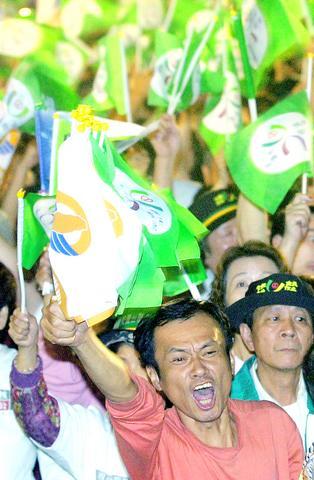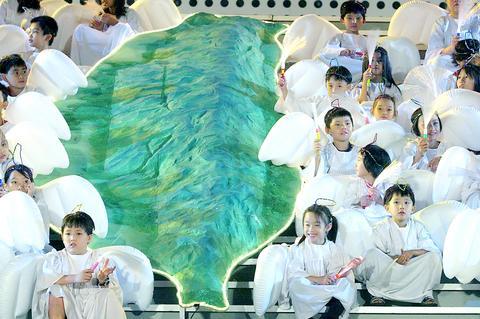Some 200,000 people took to the streets of Kaohsiung yesterday to support President Chen Shui-bian's (陳水扁) appeal for a new constitution through a national referendum, saying that it was time for Taiwan to adopt a new identity and become a real country.
Chen has repeatedly said that the new constitution would be completed before the end of 2006 and implemented by 2008, with its contents being decided by referendum.
The referendum march was organized by the Democratic Progressive Party (DPP), the Taiwan Solidarity Union (TSU), the Alliance for Legislating a Plebiscite Law (公投立法推動聯盟) and pro-independence organizations.

PHOTO: SEAN CHAO, TAIPEI TIMES
It attracted supporters from all over the country, with many foreigners also joining in the march to express support for Taiwan's democratic reform.
By noon, crowds from Taoyuan, Taipei and central Taiwan had gathered to wave flags in front of the Kaohsiung Museum of Fine Arts.
"I hope my children can experience the democratic movement and learn the spirit of people power," said 40-something Kaohsiung resident Yang Yun-tsung (楊允村), who brought his six-year-old daughter and other family members to join in with the march.

PHOTO: SEAN CHAO, TAIPEI TIMES
The march demonstrated the strength of support southern Taiwan offers the democratic and independence movements.
DPP Legislator and head of the Alliance for Legislating a Plebiscite Law Wang Sing-nan (
"We are not trying to fight China to death, and we do not have to reflect on historical tragedies and shadows," Wang said. "We just want to urge the public to think about Taiwan's future together."
At the beginning of last night's rally, Chen presented an oversized mock constitution to signify what he said was the opening of a new chapter in the nation's democratic development.
During his speech, Chen stressed that the nation's ailments -- such disagreements over the system of government, citizens' rights and legislative structure -- can only be settled by amending the Constitution through a referendum: "The draft referendum bill recently proposed by the opposition KMT and PFP sets down too many limitations for citizens to exercise their right of direct democracy," Chen said.
Chen told the cheering crowd not to expect much from the opposition alliance, especially Chinese Nationalist Party (KMT) Chairman Lien Chan (連戰) and People First Party (PFP) Chairman James Soong (宋楚瑜).
"They have been lying to you for the past few years, just like they mocked our efforts to push for the birth of the Constitution when we first introduced it," Chen said. "Now they're turning around and making the same pledge."
Whipping the night crowd into a frenzy, Chen ended the rally with repeated calls to support the DPP's campaign to push for the enactment of a referendum law and the drafting of a new Constitution.
One KMT member told listeners he backed Chen's push for democratic reform: "I am the borough chief of the Shuihsien borough in Tainan City," Shen Lien-che (沈廉哲) said. "My friend and I took the day off and drove to Kaohsiung. Although we're KMT members, we hope the DPP can continue to promote democracy and create a new constitution and avoid a return to the old ways."
Earlier in the day, Vice President Annette Lu (呂秀蓮) delivered the opening speech. She said that the day signified the end of three old eras, including Japan ending its regime in Taiwan on the same day in 1945, the UN terminating Taiwan's delegacy in 1971 and the Chiang dynasty ending its influence in Taiwan with the death of Madame Chiang Kai-shek (蔣宋美齡).
"The end of these three eras also marks the beginning of three new eras," Lu said.
"At this point Taiwanese people should think about how to give the power back to the people, how to rebuild the relationship between the people on the two sides of the strait and how to establish a new identity for Taiwan as a country."Also See Story:
Crowds march to oppose independence

FALSE DOCUMENTS? Actor William Liao said he was ‘voluntarily cooperating’ with police after a suspect was accused of helping to produce false medical certificates Police yesterday questioned at least six entertainers amid allegations of evasion of compulsory military service, with Lee Chuan (李銓), a member of boy band Choc7 (超克7), and actor Daniel Chen (陳大天) among those summoned. The New Taipei City District Prosecutors’ Office in January launched an investigation into a group that was allegedly helping men dodge compulsory military service using falsified medical documents. Actor Darren Wang (王大陸) has been accused of being one of the group’s clients. As the investigation expanded, investigators at New Taipei City’s Yonghe Precinct said that other entertainers commissioned the group to obtain false documents. The main suspect, a man surnamed

DEMOGRAPHICS: Robotics is the most promising answer to looming labor woes, the long-term care system and national contingency response, an official said Taiwan is to launch a five-year plan to boost the robotics industry in a bid to address labor shortages stemming from a declining and aging population, the Executive Yuan said yesterday. The government approved the initiative, dubbed the Smart Robotics Industry Promotion Plan, via executive order, senior officials told a post-Cabinet meeting news conference in Taipei. Taiwan’s population decline would strain the economy and the nation’s ability to care for vulnerable and elderly people, said Peter Hong (洪樂文), who heads the National Science and Technology Council’s (NSTC) Department of Engineering and Technologies. Projections show that the proportion of Taiwanese 65 or older would

Democracies must remain united in the face of a shifting geopolitical landscape, former president Tsai Ing-wen (蔡英文) told the Copenhagen Democracy Summit on Tuesday, while emphasizing the importance of Taiwan’s security to the world. “Taiwan’s security is essential to regional stability and to defending democratic values amid mounting authoritarianism,” Tsai said at the annual forum in the Danish capital. Noting a “new geopolitical landscape” in which global trade and security face “uncertainty and unpredictability,” Tsai said that democracies must remain united and be more committed to building up resilience together in the face of challenges. Resilience “allows us to absorb shocks, adapt under

Taiwan Semiconductor Manufacturing Co (TSMC, 台積電) yesterday said it is building nine new advanced wafer manufacturing and packaging factories this year, accelerating its expansion amid strong demand for high-performance computing (HPC) and artificial intelligence (AI) applications. The chipmaker built on average five factories per year from 2021 to last year and three from 2017 to 2020, TSMC vice president of advanced technology and mask engineering T.S. Chang (張宗生) said at the company’s annual technology symposium in Hsinchu City. “We are quickening our pace even faster in 2025. We plan to build nine new factories, including eight wafer fabrication plants and one advanced